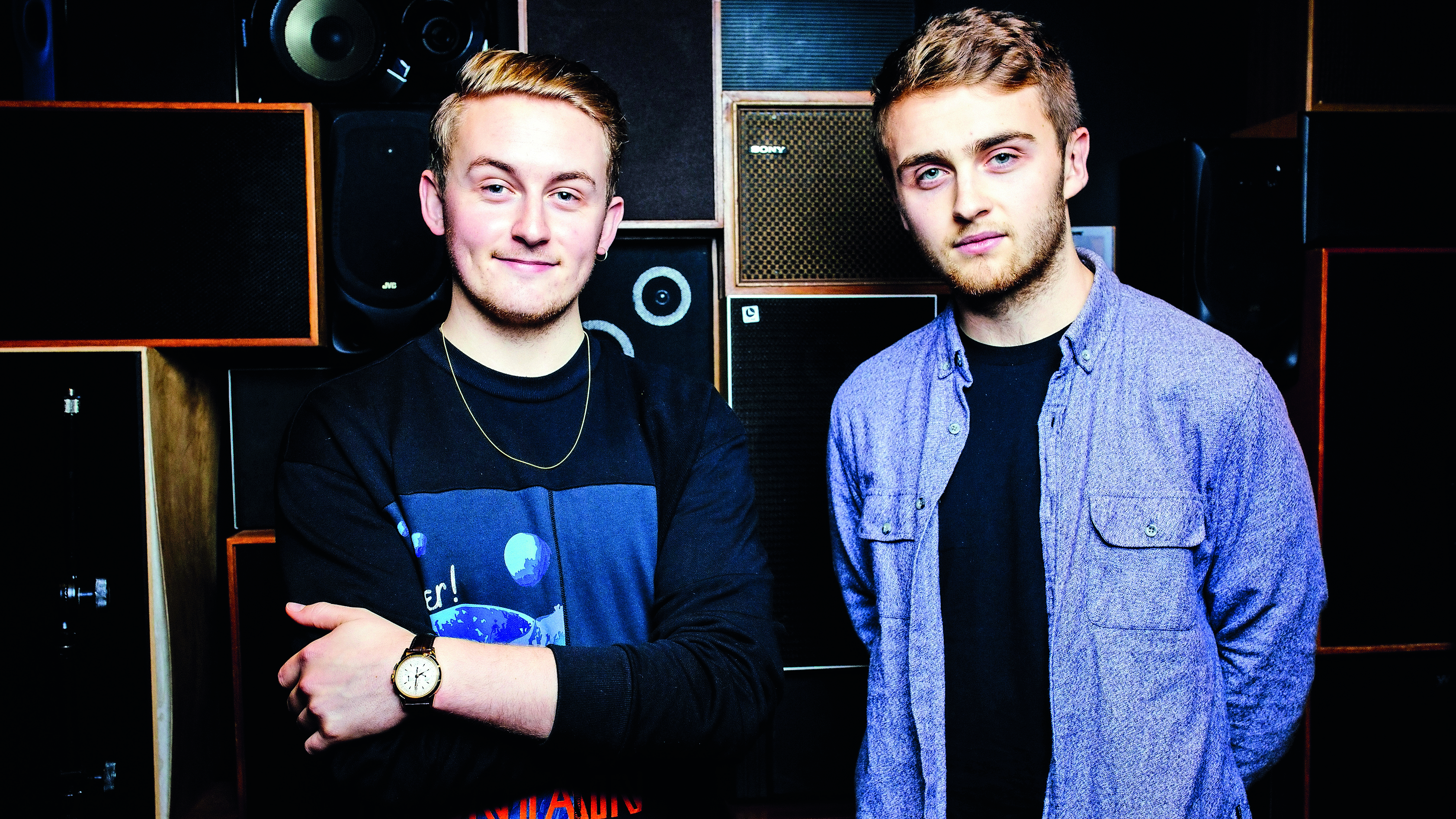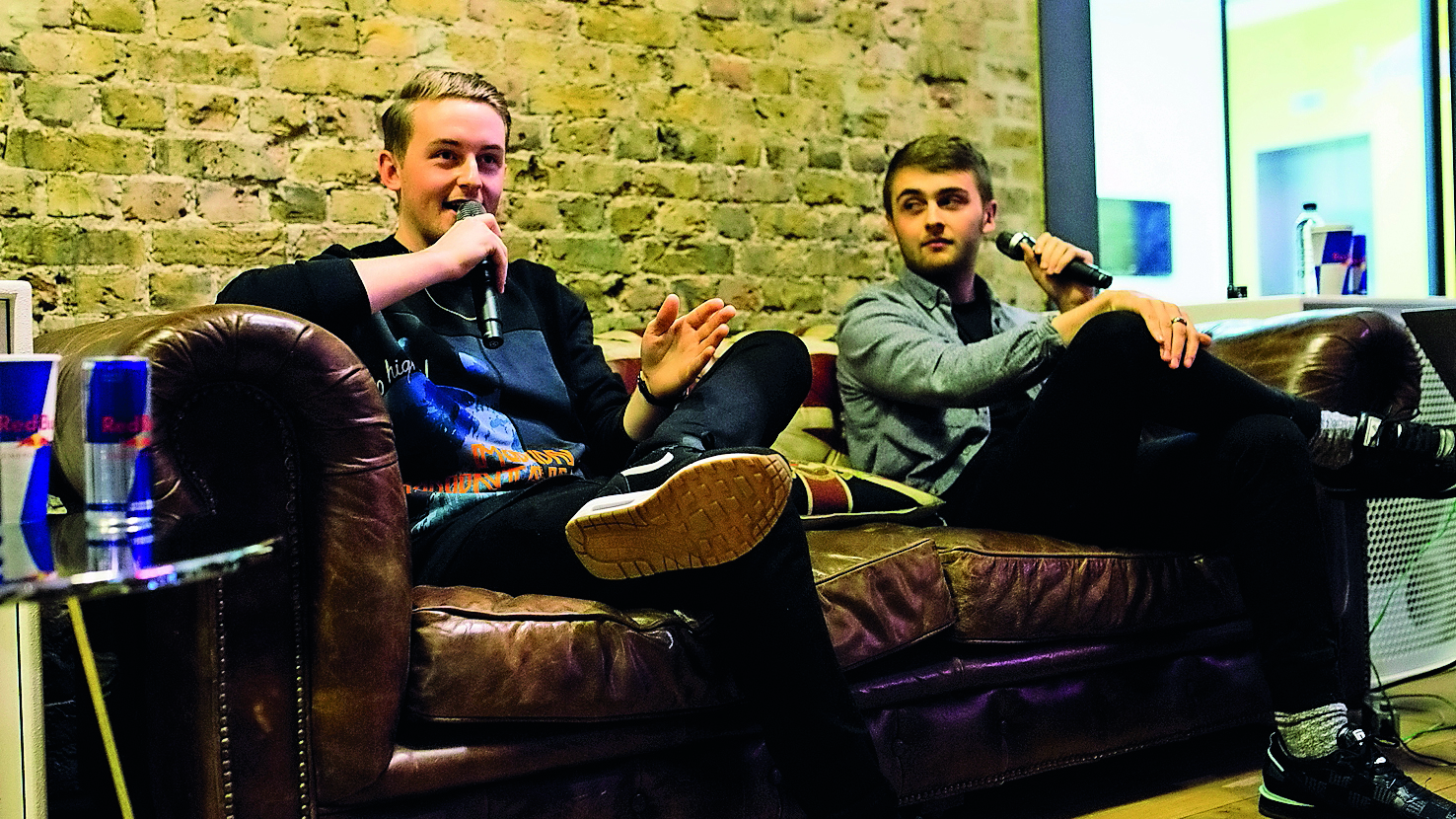Disclosure talk studios, plugins and live techno jams
The Lawrence brothers discuss the gear behind Caracal

Having renovated a disused studio above their father's village auction house, siblings Howard and Guy Lawrence set about writing the two albums that would propel them to the top of the UK charts and earn them a nomination for Best Dance/Electronica Album at the 2014 Grammys.
While writing their debut album, Settle, the duo struck up a long-standing affiliation with Red Bull Studios in London - a partnership that continued throughout the recording of their recently released second album, Caracal. At the studio's fifth birthday celebrations, we took the opportunity to catch up with the Lawrence brothers.
What's your studio space like and where do you go to make music?
Howard: "I'm trying to think actually. We were writing the first album and working out of a place in Old Street called Timber Street, which was Jimmy Napes' studio, but we were still living down in Surrey at the time. So it was a commute up, and we had to depend on whether Jimmy was in just to use the studio. Then Red Bull offered us the space in one of their rooms to come and use their equipment and microphones, which was great because they could give us a two-week block that we could come and use whenever we wanted. That was great for us because studios are expensive and we couldn't afford to get somewhere else as nice as this."
Guy: "Yeah, this is free. As long as we let Red Bull take pictures and they can tweet about it. The label was pretty happy about it, and it's great when you're trying to make your first record. We mostly use their facilities to record vocals, but we mixed and still do mix everything at home using our own gear. We had a studio above our dad's auction house, which is in a little village called Bletchingley.
"The studio was in this little upstairs flat that was lived in by our uncle back in the '70s. It was all dilapidated and ruined, but I went up there about six years ago, took a look and thought it would be nice to do this place up and get it working again. That's basically where we wrote and mixed the album Settle."
What gear did you use in that studio?
Get the MusicRadar Newsletter
Want all the hottest music and gear news, reviews, deals, features and more, direct to your inbox? Sign up here.
Howard: "We had this really old radio presenter mic. I'm not sure where it came from or why we had it. It's the same one that Stevie Wonder uses."
Guy: "I remember it because it needed a really big preamp and we didn't have one, so it was on the lowest gain ever. So we thought we should buy a really good mic and got a little KRK demo thing, but nothing was cutting the mustard because we had no compressors or EQs - we were just using this stupid little digital box straight into Logic. We knew that if we wanted all the vocals to sound as crisp as the drums and synths, we were going to need to get a good mic, which was another good reason for accepting Red Bull's invitation.
"Everything was recorded in software; we had no tape or anything. It was all done in Logic 9, very much the same as we do now. We both did music tech at college and they used Logic 7, so that's how we started with software. Otherwise, I know how to use Ableton a bit and we've both used Cubase. I think all the software DAWs are the same; it's just a question of which one you know the shortcuts for. We could do all the same things on Ableton but it would take us twice as long."
Howard: "Flying Lotus does his mixes on Ableton and I think they're some of the most amazing mixes ever made in electronic music, so who knows? I think it all depends on the person's ear really. We mixed Settle on a £40 pair of Cerwin Vega hi-fi speakers we bought downstairs in our dad's auction house and won some award from The Music Producer's Guild for the mix. Hopefully they didn't know that at the time."

Do you tend to get your albums mastered at a separate studio?
Howard: "Yeah, we went to Metropolis studios and did it with Stewart Hawkes. But that was just the mastering; we did all the mixing at home."
Guy: "It's nice to run everything through a bit of analogue stuff just to make it all come together and add a bit of sparkle. We do quite a bit of stereo widening, bringing up the far edges of the mix and spend a lot of time just listening and getting the space between the tracks correct. It's more about getting the playback right and making sure one vocal isn't more trebly than another."
Howard: "I think you can get a perfectly good master at home now, but if you want to have continuity throughout an album… and for everything to be the same volume, you might need some help. I've got loads of albums, old ones especially, that have been self-mastered - one in particular by Steely Dan where the single is ten times louder than the rest of the album tracks."
Guy: "I think it's quite important to get your stuff mastered. Even getting them mixed is fine, but with dance music if you're the producer then, quite a lot of the time, the mix IS your sound. If we got someone else to do it, it wouldn't sound like a Disclosure record. Mastering is more about gain and EQ, not so much about the sound of the instruments."
Most of your production's done in the box... Which soft synths are you using?
Guy: "For this album, the one we used a lot was Diva by u-he; I love it. We love any soft synth that sounds like a Roland Juno basically. With Diva, you can put a twist on it and do something different that a Juno can't, but it has that warmth and that nice choral sound, so we were sold."
Howard: "I was literally sat with my Juno today. It's got into a bad state at the moment where it only plays three notes at a time, so I switched from it back to Diva and was like, 'Ahhh, that's perfect!' [laughs]. It's basically like having a more reliable Juno."
Guy: "A lot of times, people have credited our songs for having that old school vibe and feel, but 90% of the instruments used were soft synths. I think we're able to get that sound by being careful with the EQ and compression. If you think something's too digital-sounding, add some tape hiss or a bit of vinyl crackle and you can replicate it. If a purist comes along and says it's still not the same, you're not playing it, then... I don't even play keys, I'm a drummer. This is the only way we can get the ideas out of our head. Even when we're playing the Juno, we'll sometimes draw it in on Logic. Sometimes I can't play the ideas that I want to hear, but because I can hear them I draw them in on Logic. Then you can do all the filters and, as I've got a 106, when you send MIDI it can play itself. That's the way I like to do it."
The album has a nice warm, old school vibe to it. Can you correlate that with the music you grew up listening to?
Guy: "Yeah, we grew up super young listening to a lot of Pop and Soul or R&B. We were trying to play instruments; I was trying to learn drums, Howard the bass. So I was listening to a lot of crazy Jazz and Prog Rock with mad rhythms to try and become the best drummer and Howard was listening to a load of Funk. There wasn't much electronic or dance music involved in that, but once I turned 16/17, got my fake ID and started going to clubs in 2007, Dubstep had fully cemented itself.
"For me, as a young person, stepping into a club was a new situation, and hearing a brand new sound like nothing I'd ever heard before was quite an inspiring moment. I'd take all the records home and show Howard, and we agreed that Dubstep was probably the most forward-thinking sound happening in the UK or the world at the time. So we got into that, and when we started Dubstep we realised that it came from Garage and Grime, and that came from House, so through tracing it back, buying records and downloading songs, we ended up relentlessly listening to House and Garage. That's why when we came to write the album we chose to produce the songs in that style."
Do you have any other hardware?
Guy: "We do have some mics at home now - we've both got Neumann mics and Tannoy monitors. Oh, we've actually got some Neumann monitors that are really sick. We did some stuff for Sennheiser and because Sennheiser and Neumann have merged they told us to try these monitors out and they're fucking epic. I think they're made for mastering really."
Howard: "I prefer the Tannoys for writing."
Guy: "For writing, really? I prefer the Tannoys for mixing because there's not much sub but they've got a good mid-range - an NS10-type of vibe, but the Neumann's are pretty subby and quite exciting to have up loud while you're writing. We use an Avalon EQ compressor for the mic. Apart from that, Howard's got a Rhodes and there's a Moog Little Phatty at my house and I've got all the new Roland stuff including the TR-3 and the TR-8 - the black and green ones. We've also started using the 909 in the live show, which is really good."
Were they bought for live or studio?
Guy: "Both now, because we play live shows almost every day. We didn't actually use the 909 itself much on the album, but we used the sounds off it if that makes sense? I've never pressed play or used the sequencer on it, but live we do. There's a whole section in the live show now where there's no track at all but a 10-minute Techno jam. We turn all the lights off and just have the strobes on with me pretending to be Jeff Mills on the 909 and Howard doing Moog solos. Then we start to burn samples over the top with no track at all, which is really fun."
Howard: "It's actually one of my favourite parts of the show because it changes every night. You come off stage and people who've been on tour with us, like our sound guy, no longer just say "great show guys", but that was good tonight because of "the 909 bit". Instead of playing the same stuff every night, which is obviously part of it, it's nice to have an element of the show that can change a bit."
Read more in issue 300 of Future Music, on sale 17th December.


“I’m looking forward to breaking it in on stage”: Mustard will be headlining at Coachella tonight with a very exclusive Native Instruments Maschine MK3, and there’s custom yellow Kontrol S49 MIDI keyboard, too
“Turns out they weigh more than I thought... #tornthisway”: Mark Ronson injures himself trying to move a stage monitor









